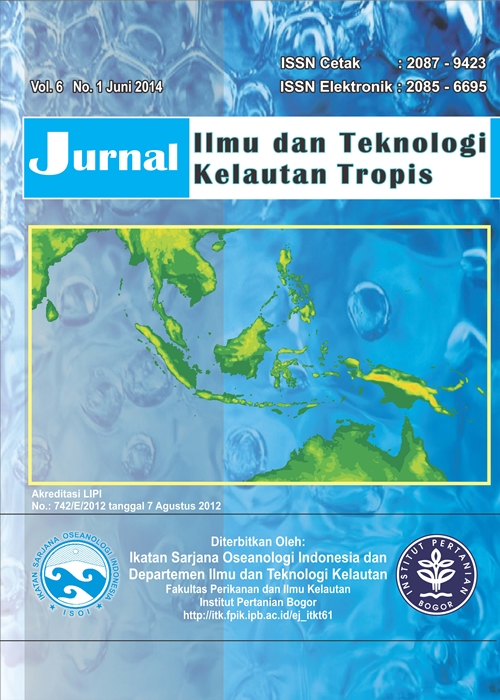SEAWATER QUALITY FOR SHRIMP MARICULTURE BASED ON MICROBIOLOGY PARAMETERS
Abstract
Seawater quality plays an important factor for the success of mariculture such as microbiology paramater. The research aimed to analize the waters quality for shrimp mariculture in Barru, Pangkep, and Maros based on bacteriology parameters. The research were carried out in June 2012. Bacteriology parameters analysed were total coliform, E.coli, pathogen, heterotrophic, halotolerant, and phosphate-nitrate-ammonia bacteria. Coliform and E.coli bacteria were analysed based on filtration. Pathogenic bacteria was identified using biochemical test. Heterotrophic, halotolerant, and phosphate-nitrate-ammonia bacteria were analysed using pour plate. The results from shrimp aquaculture showed the total abundance of coliform cell of >1000 colony forming unit (cfu)/100 ml, E.coli of 0-4 cfu/100ml, heterotrophic bacteria of about (31-176)x103 cfu/ml, and halotolerant bacteria of about (31-375)x103 cfu/ml. The results from sediment for heterotrophic bacteria was about (350-3920)x103 cfu/ml, halotolerant of about (350-4980)3x10 cfu/ml, and phosphate-nitrate-ammonia bacteria of about 14-46 cfu/ml. The pathogen bacteria waere found such as genus Aeromonas, Pseudomonas, Proteus, Citrobacter, Shigella and Yersinia. The dominant pathogens in shrimp aquaculture water and sediment were Proteus and Citrobacter. The results indicated that seawaters in Barru, Pangkep, and Maros can be used for mariculture including shrimp Panaeid.
Keywords: bacteria, parameter, marineculture, shrimp.
Authors
This work is licensed under a Creative Commons Attribution 4.0 International License.
Jurnal Ilmu dan Teknologi Kelautan Tropis i is an open-access journal, meaning that all content is freely available without charge to the user or their institution. Users are allowed to read, download, copy, distribute, print, search, or link to the full texts of the articles in this journal without needing to request prior permission from the publisher or the author.
All articles published by Jurnal Ilmu dan Teknologi Kelautan Tropis are licensed under the Creative Commons Attribution 4.0 International License. This allows for unrestricted use, distribution, and reproduction in any medium, provided proper credit is given to the original authors.
Authors submitting manuscripts should understand and agree that the copyright of published manuscripts is retained by the authors. Copyright encompasses the exclusive rights of authors to reproduce, distribute, and sell any part of the journal articles in all forms and media. Reproduction of any part of this journal, its storage in databases, and its transmission by any form or media is allowed without written permission from Jurnal Ilmu dan Teknologi Kelautan Tropis.


